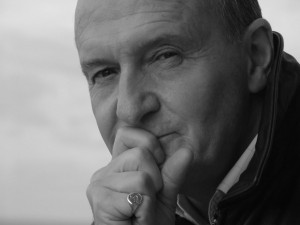On breaking the mould
Guest post by Robert Mercer-Nairne (MBA 1971 and PhD 1989)
Dr. Mercer-Nairne actively seeks “to define how human organization forms and evolves as an expression of evolution as a whole.” His work can be found in novels like The Letter Writer, set in Bellevue, WA, to more recently in regular contributions to the Huffington Post. Mercer-Nairne currently resides back home in Scotland where he continues to grow beyond his original focus on organization theory.
 Probably the greatest challenge facing the developed world is growth. This is not least because we are unclear what the word means. We have various statistical definitions, such as the augmentation of our gross domestic product—essentially the level of our economic interactions with one another—but our gut instincts tell us that such measures may not address the quality of growth. One example of that is our increasing awareness that the lifestyles we enjoy today may be adversely affecting what our environment will be tomorrow. The post-war notion that we can look forward to a better future for ourselves and our children has become decidedly tarnished.
Probably the greatest challenge facing the developed world is growth. This is not least because we are unclear what the word means. We have various statistical definitions, such as the augmentation of our gross domestic product—essentially the level of our economic interactions with one another—but our gut instincts tell us that such measures may not address the quality of growth. One example of that is our increasing awareness that the lifestyles we enjoy today may be adversely affecting what our environment will be tomorrow. The post-war notion that we can look forward to a better future for ourselves and our children has become decidedly tarnished.
Probably the greatest challenge facing the academic profession right now is how to escape from its own departmental rigidities so that the challenges facing the human world can be looked at afresh. Are these problems connected? I think so. The expression Breaking the Mould refers to doing something differently, after it has been done in the same way for a long time. In the scientific world, the physicist Thomas Kuhn called these mould-breakings ‘paradigm shifts’. Because of their fundamental nature, they inevitably upset a lot of careers laboriously built upon the old way of seeing things. Consequently their heralds, like the three kings, are invariably dismissed as being weirdoes, troublemakers or just plain delusional.
In most walks of life, the line between maverick and idiot is narrow. Shakespeare’s Sir John Falstaff is a buffoon whose comic utterances often embody a wisdom which would be unpalatable to the status quo without humor. In his short story The Emperor’s New Clothes, Hans Christian Anderson uses the innocence of a child to puncture the crowd’s acceptance of the emperor’s sartorial magnificence (two swindlers make him an ‘invisible suit’ that can be ‘seen’ only by the worthy and naturally his sycophantic subjects see it even though there is nothing there). Philosophers occasionally debate whether the sane are insane and the insane sane. And even the scientific quest for objective reality can be subverted by the context within which a scientific question is phrased.
My own area of interest – the nature of structure in the evolutionary process—spans every discipline imaginable qualifying me for the accolade insane idiot, although I would prefer maverick. What I am fairly certain of, however, is that while we need the mould—without structure we have nothing – we must pay far more attention than we do to the process whereby moulds are broken and new moulds are formed. And unless you believe in a deterministic universe (and I certainly don’t) space must be left for the creative impulse to work—in politics, in business, in academe.
In the twentieth century we allowed ourselves to be led seriously astray by the false assumption that there was such a thing as inevitable social progress which overrode any moral notion of individual right or wrong. Structure always and everywhere is a function of context. In the conscious, human world, that context is shaped by our values. Start there and growth suddenly becomes limitless and sacred cows (or sacred moulds) less sacred.
